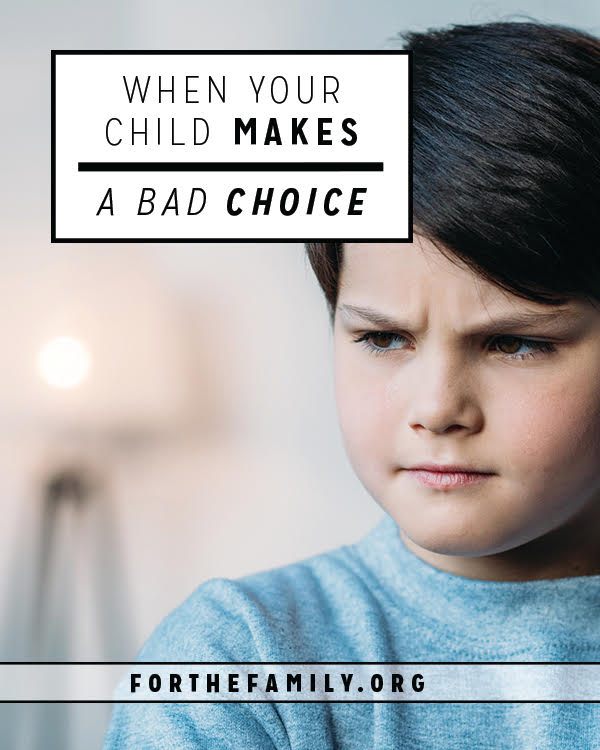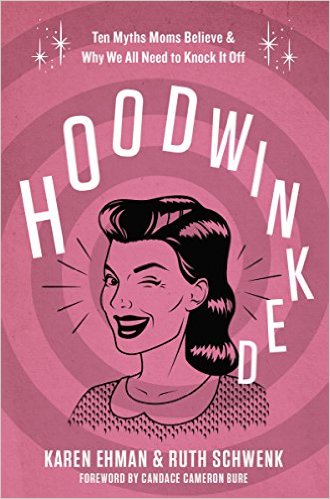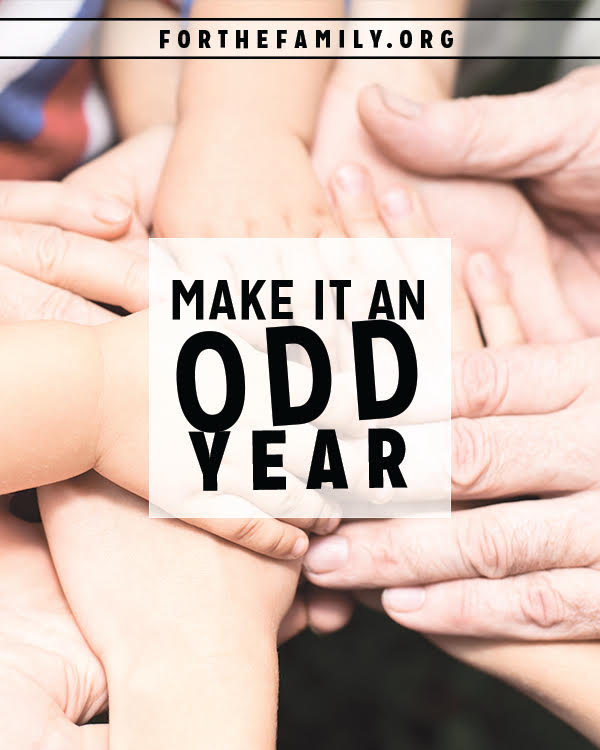When Your Child Makes a Bad Choice
 As my three children have gotten older—two now adults and one in his teens—I am seeing how very much I as a mom latched on to this very common myth of motherhood:
As my three children have gotten older—two now adults and one in his teens—I am seeing how very much I as a mom latched on to this very common myth of motherhood:
My child’s bad choice means I’m a bad mom.
From the moment our child emerges from the womb, or we picked them up at the appointed adoption location, we get a front row seat in watching our child behave. At times their behavior makes our hearts sing. Their first smiles. First steps. Watching their darling personalities emerge. Some things they do might invoke laughter of hilarity, or a bout with serious sickness may bring out the most sympathetic feelings we have in our mama hearts. Each day that passes find us falling more and more in love with him.
However, there are some detours along the way. Our child may do or say something that causes us alarm. Even embarrassment or anger. Or maybe just threatens to make us look like we don’t really know what in the world we are doing in parenting a child because her behavior is exasperating, not exemplary.
As my children have grown older, I have picked up some lessons along the way about our faulty view of our kids’ decisions. I pray they help you as you watch your kids fail, learn, and grow.
-
It is a parent’s duty to teach their children about the Lord and what he requires.
There are scads of verses in the Bible that instruct parents to instruct their kids. We see early in the Bible—as the Lord was instructing the Israelites how to live in the way that he requires—that they were to be certain to pass along all the info to the kiddos too.
Fix these words of mine in your hearts and minds; tie them as symbols on your hands and bind them on your foreheads. Teach them to your children, talking about them when you sit at home and when you walk along the road, when you lie down and when you get up. Write them on the doorframes of your houses and on your gates, so that your days and the days of your children may be many in the land the Lord swore to give your ancestors, as many as the days that the heavens are above the earth. (Deuteronomy 11:18–21)
So today we might think of it this way: Talk about God’s laws and what he has done in your life. When you eat a formal dinner or just sit and snack in the living room. When you are driving in the car or waiting in line in the carpool. Text biblical encouragement to them when they are away with their friends. Work a verse into your conversation as you are tucking them in at night. Hang Scripture signs in your home. Anything you can do to get the Word of God in front of their eyes, wafting into their ears, and solidified in their hearts. Our kids need to know what is required of them by God so they can learn to make decisions according to his ways.
-
It is a parent’s duty to model for their children a growing relationship with Jesus and what he provides.
Just knowing what God requires of us isn’t enough. Our kids must know where (or better yet to whom) to go to be empowered to live the Christian life. Don’t be a private Christ-follower, never allowing your kids to see your relationship with him up close. Of course we don’t want to practice good deeds in front of our kids simply to be noticed. However, we should allow them to get a glimpse of what a real walk with Christ looks like.
Talk with them about your relationship with God. What are you learning as you read your Bible today? Is there a particular lesson that has really hit home for you in your Bible study group or small group at church? Don’t just share the concepts with your close friends; talk out loud about them with your children. Of course, if your children are very small, you may have to break it down for them, telling them only the very basics of the biblical truth and giving it to them on a level they can understand. Seeing you be excited about what the Bible says and how it is coming to life for you can be contagious. Your children can be infected early with the Bible bug!
Also let them see that prayer works. Tell them what you are praying about currently. Give them specific requests for them to pray about too. As God answers, discuss his answers with your children. It is helpful to teach them from early on that God is not some genie in a bottle, where we rub our hands together in prayer and then stand back and watch him grant our every wish.
Being an on-purpose parent means we let our children see us conversing with God, applying his Word, and completely trusting his wisdom and will.
-
If our children misbehave when they are small, it might be due in part to our lack of instruction.
Yes. There is truth to the statement that if a young child misbehaves in some situations, it might be due in part to the lack of training by a parent. Is four-year-old Junior helping himself to some candy-striped gum at the store, pocketing it without paying a penny? Well, if mom and dad never taught him that such behavior is against the law, then of course they helped to bring about the sticky situation of this Juicy Fruit juvenile. Misbehaving and out-of-control young children are sometimes due in part to lackadaisical parenting. A failure to teach children right from wrong—or to impart proper behavior and manners—can lead to bad behavior in a young child. However, the older the child gets, the more responsibility must be put on her shoulders. When you have been diligent to teach your child right from wrong and they are a preteen or older, resist the urge to label yourself a bad parent if she makes a wrong choice.
-
If our children do wrong when they are preteens, teens, or adults, we should help to guide them back to the right path without beating ourselves up for the wrong turn they took.
Oh, this is so hard! Our human nature wants to lash out, to holler and scream, “WHAT WERE YOU THINKING!?!?!” Chances are, they weren’t. Teens—especially of the male sort—don’t always think before they act. In fact, the decision-making part of their brain isn’t fully developed until they are about twenty-five years old! We expect them to make decisions as we would—we who are adults, with experience and fully developed brains. But they don’t always. We must help to correct them. Dish out consequences too. But we must not beat ourselves up over their bad choices.
And when our kids do make bad choices, we must still continue to be a parent—guiding them, loving them, and cheering them on. It doesn’t mean we wink at their wrongdoing, passing it off as no big deal. It does mean we fight the urge to blow up and shame, condemn, and reject. We need to pour our heart out to the Lord while we pour compassion and love out on our child. There is no need for a lecture. There is a need for unconditional love.
I’m so thankful that we are not bad parents just because our child makes a bad choice. It is hard enough dealing with our own choices sometimes. Besides, think of it this way—if you are directly and solely responsible for your child’s bad behavior, then is the flip side also true? Should you take credit for their good and godly choices? No. Anything good and godly in my kids finds all the credit going to God. They make right choices despite my being their parent, because I am imperfect. Any bad choices they make, they own.
-
Sometimes our children’s bad behavior continues because we fail to issue consequences.
In loving our kids when they have done wrong, let’s be careful not only warn our kids to stop without giving them what consequences will happen if they don’t. When our kids are not following the laws of the land—or of the Lord—let’s not be afraid to confront them. We can be instrumental in helping them to get back on the right, and righteous, path.
-
Don’t raise a herd.
While there is merit in having the same rules for all of your children when it comes to issues such as curfew, dating, and such, resist the urge to raise a herd. Children must be treated as individuals. The same discipline will not always work for every child. They have different personalities. They have different reactions to different consequences.
When our children were smaller, we realized that we needed to give out a different consequence to each child for misbehaving. One simply could not stand having to do extra work around the house such as mopping floors or pulling weeds. Her brother, however, loved hard work. If we made him pull the weeds in the herb garden, it wouldn’t bother him at all. He would actually enjoy it. For this child we issued monetary consequences. He hated parting with his cash! The third child was not deterred by either of these consequences. But, boy-oh-boy, don’t take away a social gathering from him—to this day! When he misbehaved as a young boy, he had to miss a birthday party or sports outing. That was what hurt him most.
-
Raise your children on your knees.
Most crucial. Most needed. But sometimes, most overlooked. Especially if you are a “doer.” Doers like to do. People who are doers think they should not just sit there but should do something. Sometimes prayer feels like just sitting there. But we have to get this notion out of our brains. Prayer is the most crucial thing when it comes to raising our children. We must raise our children on our knees. Going to God in times of crisis and in times of joy helps to solidify our relationship with him and helps to bring about change in the life of our children. So pray, pray, PRAY!
-
Remind yourself that you are seeing the beginning of their testimony.
Once when I was especially distraught over a not-so-hot choice one of my kids had made, I called my friend Lynn. Through my sobs, she heard my heartache and told me exactly the words I needed to hear right then. “Karen, you have to remind yourself that you are seeing the beginning of their testimony. This is not the end.”
Her words caused me to stop the runaway monologue in my head that was droning on and on about my child’s bad behavior. Instead, I suddenly recalled all of the wonderful people I know today who have a wild testimony. Many of them today are sold-out for Christ and serving him in amazing ways. But they all had made horrible choices as a teen or young adult. Some were just immoral. Some were against the law. All were downright wrong. However, despite their bad choices early on in their life, God drew them to himself and they responded. Their testimonies are powerful and show to others the compassion and forgiveness of a holy and mighty God.
Parents, God is greater than the fallout from the choices of your small child. He is greater than the bad decisions they might make during their elementary school years. He is far greater than the consequences of their wrong choices as a teen. And he is greater still than what heartache they may bring to you when they are adults.
Do not tether your identity to the choices of your child—whether stellar or stupid. We are not our child’s choices. Their choices—and their behavior—are their own.
Blessings,
Karen Ehman, KarenEhman.com
If you have found yourself believing this myth of motherhood, there are many more! Moms have been hoodwinked—tricked into believing lies that keep them from not only enjoying motherhood, but forging friendships with other moms who might tackle the tasks of motherhood differently. Myths such as “Mothering is natural, easy, and instinctive” cause moms to feel like failures if they have questions or apprehensions in raising their kids. Operating from the premise that “The way I mother is the right (and only) way” puts up fences between moms instead of building bridges of encouragement between them. Lies such as “I am my child’s choices” tempt moms to mistakenly believe that if their child makes a wrong choice then they, in turn, must be a bad mom.

Grab your copy of Hoodwinked and join us as we enable you to:
- Identify the ten myths of motherhood our current culture perpetuates
- Replace the lies with the truth of what God says in the Bible about mothering
- Acquire practical tools to help you form new and improved thought patterns and healthy behaviors
- Forge healthy, supportive relationships with other moms of all ages and stages
- Confidently embrace the calling of motherhood as you care for your family in their own unique way






